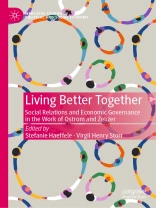Elinor C. Ostrom, a Nobel prize winning political economist, made important contributions to common pool resources, economic governance, and polycentricity. Viviana A. Zelizer, a prominent economic sociologist, has done groundbreaking work on how culture shapes our economic lives. Together, the work of Ostrom and Zelizer spans the disciplines of economics, sociology, political science, and public policy by exploring the social relations and community-based organization of everyday life. Both scholars examine the norms, social connections, and cultural impacts of exchange and governance. This volume explores their contributions and builds off of their research programs to explore the social movements, community recovery, and war, and women’s issues across a variety of disciplines, including economics, political science, sociology, history, and archaeology.
Inspired by Zelizer’s 2019 Ostrom Speaker Series lecture for the F. A. Hayek Program for Advanced Study in Philosophy, Politics, and Economics at the Mercatus Center at George Mason University, this volume explores the connections between the work of Elinor Ostrom and Viviana Zelizer. Beginning with a lead chapter by Zelizer where she reflects on the connections between her work and Ostrom’s oeuvre, the volume brings together scholars who tease out some of the important concepts and implications of Ostrom and Zelizer’s research. This volume furthers economic inquiry by ensuring that the critical examinations of these timely and important themes are made available to students and scholars.
สารบัญ
Chapter 1: Introduction: Connecting Elinor C. Ostrom and Viviana A. Zelizer, Stefanie Haeffele and Virgil Henry Storr.- Chapter 2: Why and How do Social Relations Matter for Economic Lives? Viviana A. Zelizer.- Chapter 3: What Relational Work Brings to the Study of the Political Economy, Victoria Reyes.- Chapter 4: “Circuits of Commons”: Exploring the connections between economic lives and the commons, Carolina Dalla Chiesa, Valeria Morea, and Francesca Sabatini.- Chapter 5: Testing Circuits of Commerce in the Distant Past: Archaeological Understandings of Social Relationships and Economic Lives, Crystal A. Dozier.- Chapter 6: Bringing the Family Back In: Political Economy and the Family in Liberal Theory, Brianne Wolf.- Chapter 7: Polycentric Institutions of Intimacy, Jayme S. Lemke.- Chapter 8: Beyond Relief: Understanding the Cuban Diaspora’s Remittance Sending Behavior, Anne Hobson and Stefanie Haeffele.- Chapter 9: The Economic Circuits of Social Movements, V. Miranda Chase.- Chapter 10: Captains’ Mail Circuits: Examining Social Relations in Letter Transfer, 1700-1774, Hannah Knox Tucker.- Chapter 11: Institutional Diversity in Social Coordination Post-Disaster, Laura E. Grube.- Chapter 12: Wartime Governance in the Syrian Civil War, Jennifer L. Hudson.- Chapter 13: The Institutional Diversity of Online E-commerce Platforms in China, Minjun Yuan and Wanlin Lin.
เกี่ยวกับผู้แต่ง
Stefanie Haeffele is Senior Research Fellow, Senior Program and Operations Director of Academic and Student Programs, and Senior Fellow for the F. A. Hayek Program for Advanced Study in Philosophy, Politics and Economics at the Mercatus Center at George Mason University.
Virgil Henry Storr is the Vice President of Academic and Student Programs the Don C. Lavoie Senior Fellow in the F.A. Hayek Program in Philosophy, Politics and Economics at the Mercatus Center at George Mason University, and a Professor of Economics in the Department of Economics at George Mason University.












